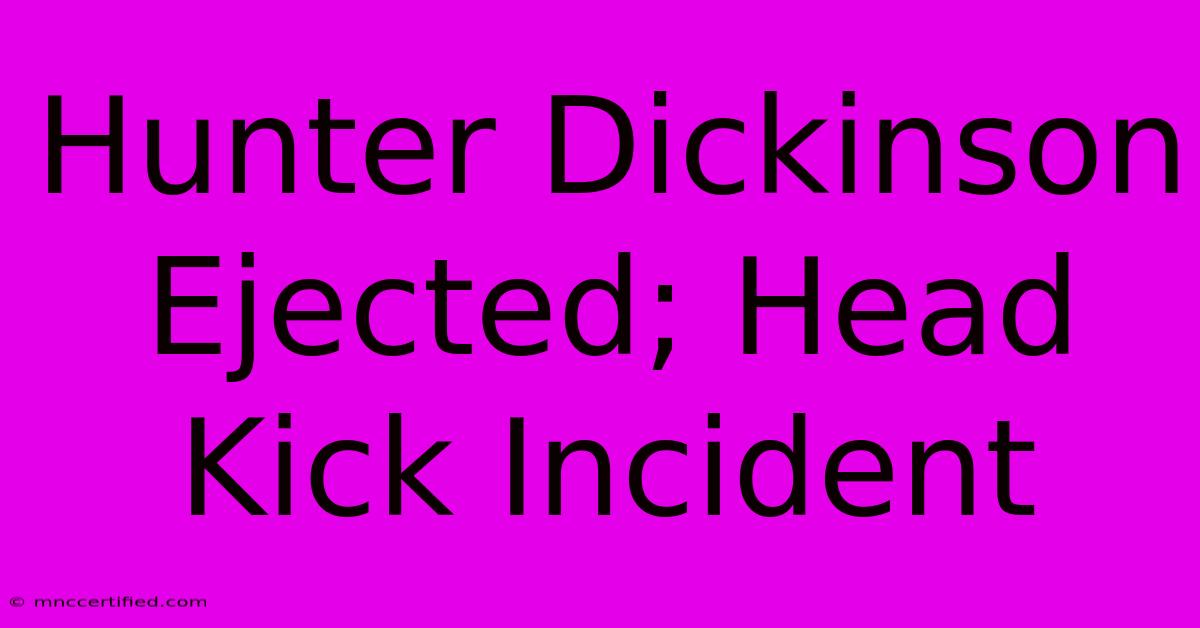Hunter Dickinson Ejected; Head Kick Incident

Table of Contents
Hunter Dickinson Ejected: A Deep Dive into the Head Kick Incident
The college basketball world was shocked by the ejection of Hunter Dickinson, the star center for the University of Michigan Wolverines, during a recent game. The incident, involving a seemingly unintentional but ultimately consequential head kick, sparked a firestorm of debate and discussion across social media and sports news outlets. This article will dissect the event, analyzing the play, the resulting ejection, and the broader implications for the player, his team, and the officiating in college basketball.
The Play: A Moment of Controversy
The incident occurred [Insert Date and Opponent Here] during a heated moment in the game. A scramble for a loose ball ensued, with players from both teams vying for possession. In the midst of the chaos, Dickinson's leg made contact with the head of [Opponent Player's Name]. While seemingly unintentional – many commentators have pointed to the fast-paced, high-stakes nature of the play – the referees deemed the contact worthy of an ejection.
What the Video Shows (and Doesn't Show)
Videos of the incident circulating online show a chaotic sequence of events. It’s difficult to definitively determine intent from the available footage. Some angles suggest an accidental collision, while others may lead viewers to a different conclusion. The lack of clear video evidence makes determining culpability a complex task, fueling further discussion about the call. The key issue is the lack of clear and deliberate intent to injure. This is a critical factor in evaluating whether the ejection was justified.
The Ejection: Justification and Fallout
The referees' decision to eject Dickinson was immediate and, to many, controversial. The severity of the penalty contrasted sharply with the seemingly unintentional nature of the contact. This raised questions about:
- Consistency in officiating: Are similar incidents consistently penalized with ejections, or was this a unique circumstance? This calls for analysis of similar incidents in college basketball to assess the consistency of officiating standards.
- The impact of game context: Did the heated nature of the game influence the referees’ decision? Analyzing the overall tone and intensity of the game might offer context.
- The player's history: Did Dickinson have a history of similar infractions, potentially impacting the referees' judgment?
The ejection had significant ramifications for the Wolverines, impacting their strategy and potentially the outcome of the game. The loss of their star center left a significant gap in their lineup, and this impact is likely to be felt in subsequent games.
Public Reaction and Social Media Frenzy
The incident ignited a passionate debate on social media, with fans and analysts sharply divided on the appropriateness of the ejection. #HunterDickinson trended heavily on platforms like Twitter and X, showcasing a vast spectrum of opinions. Some defended the referees' decision, citing the need for player safety, while others criticized the call as overly harsh and inconsistent with similar incidents. This highlights the role of social media in shaping public perception and the intense scrutiny placed on officiating in college sports.
Looking Ahead: Implications for the Future
The Hunter Dickinson ejection serves as a case study in the complexities of officiating in a high-stakes, physically demanding sport. It raises important questions about:
- Refresher training on similar incidents: Could improved training for officials lead to greater consistency and fairness in applying penalties for similar actions?
- The use of technology in officiating: Could incorporating technology, such as replay reviews, provide greater clarity in these kinds of disputed incidents?
- Player responsibility and sportsmanship: What responsibility do players have to mitigate such incidents, even in the heat of competition?
The incident underscores the need for continued dialogue surrounding officiating fairness, player safety, and the role of technology in shaping the future of college basketball. The long-term impact on Hunter Dickinson's reputation and career remains to be seen, but the incident will undoubtedly shape discussions regarding player conduct and officiating for years to come.

Thank you for visiting our website wich cover about Hunter Dickinson Ejected; Head Kick Incident. We hope the information provided has been useful to you. Feel free to contact us if you have any questions or need further assistance. See you next time and dont miss to bookmark.
Featured Posts
-
Viral Election Petition Small Business Owner
Nov 27, 2024
-
Kansas Dickinson Ejected For Head Kick
Nov 27, 2024
-
Harvey Milk A Political Martyr
Nov 27, 2024
-
Bravo Renews Vanderpump Rules Entire Cast
Nov 27, 2024
-
Wendy Williams Health Update Tmz Report
Nov 27, 2024